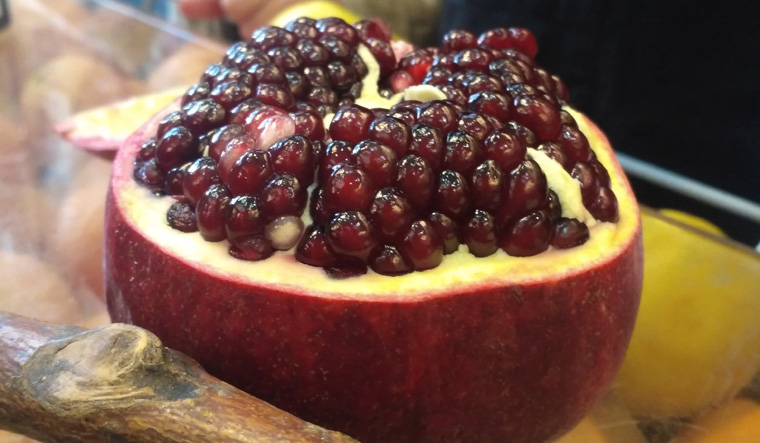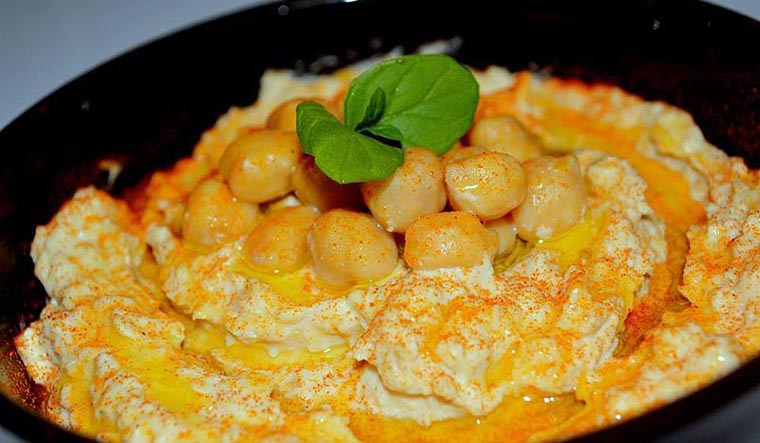The minute the two words 'Israel' and 'food' are said in the same breath, the first thought that comes to mind is 'kosher', and with it, all the restrictions that are part of Jewish food customs.
Kosher is a lot more complicated than a few culinary taboos. It encompasses an entire philosophy—procuring, preparing and partaking victuals, much like our Ayurveda system. Perhaps this is why Indians do not face too many issues while navigating the Jewish cuisine, unlike people from other parts of the world. When someone tells us she/he is a no-onion-no-garlic person, or they are an 'eggetarian', or they are non-vegetarians except on some days of the week, we understand.
There are certain ground rules in Jewish food customs. Dairy and meat cannot be consumed together, because “a kid cannot be cooked in its mother's milk”. So, butter chicken is a no-no. Fish is fine, but only if it has scales. So, catfish cannot be eaten. No prawns or any other kind of shell fish. Pork is out too.
Now that we've taken care of what we can't, let's move on to what we can eat in Israel. Surprise surprise, there is so much to sample that kosher and other restrictions simply do not matter.
Yahil Zaban, a literature professor at Tel Aviv University, who has researched extensively on food in Jewish and Hebrew literature, says, “Israeli food today is influenced by several cultures, as the Jews who returned here from various parts of the world brought their own flavours and ingredients. Those, when combined with the inclination to cook as they did in Biblical times, with olives and local herbs, make up today's Israeli cuisine.”
Hummus tops the charts when it comes to Israeli food. Zaban believes Israelis are almost maniacal about this simple dish of chickpeas and sesame. “There are over 1,000 hummus diners in the country, and we consume over 30,000 tonnes of it every year,” he says. Recent archaeological evidence, whch points to people eating something like hummus 7,000 years ago has only raised the status of the dish. It's a dish that unites and divides. The Palestinians, Lebanese and Turkish all claim their hummus is the best. Much of Israel's food wars are about whose is better, and whose is bigger. In a recent endeavour to enter record books, one diner presented the largest platter—a satellite dish full of hummus.
Falafel is Israel's answer to the burger. The simple dish of spiced and fried chickpea balls stuffed into a pita pocket with some salad can be the Israeli version of our own desi vada pav. Or it could become a gourmet dish in the hands of chefs like Eyal Shani, with fillings ranging from shrimps (yes, not all are kosher fans) to chocolate and bananas. He even did one version with liver-stuffed pita, naming the dish 'Intimate Parts'.

Israel is a desert which grows some of the best vegetables, thanks to irrigation innovations. So, there's a range of veggies to be had in every meal. The simple Arab salad is cucumbers and tomatoes with lemons and olive oil. To this, several other ingredients are added, depending on the chef's creativity. Veggies take other interesting forms, too. The vine leaf rolled dumplings, and stuffed with rice, are amazing, as are the assortment of roasted pumpkins and beets that accompany most meals.
Israel is one of those countries which provide amazing vegetarian options, a huge relief for Indians. There are several varieties of cheese to choose from. It is also one of the most vegan friendly countries in the world. In just about any restaurant, your order can be customised according to your food restrictions.
The local Israeli loves the shakshuka, a dish of baked tomatoes and eggs. It came to the Promised Land from Africa and it's best eaten piping hot. They also love schnitzels, an Austrian dish that has been modified to local taste, and is now a chunk of batter-fried chicken, served with pita.
While there are celebrity chefs and restaurants galore to choose from, a popular tour with visitors is the food tour. Orit Levi, our tour guide, took us through the food streets of Jerusalem, showing us an amazing range of ingredients, styles, and flavours. There's Hachapoori, a bread baked with cheese and eggs in the centre. Tear off chunks of the bread, swirl them in the eggs and cheese mix in the centre and you are in culinary heaven. As we ate our way through the streets, learning about the provenance of the potato-filled pasties and the crispy sambusak, we could see throngs of other tourists, doing the same with their guides.
There's good selection for the sweet tooth. The Rugalach is a sinful chocolatey dessert that came from eastern Europe. The most popular though, is the halwa, a sweetmeat made with sesame seeds.
Israeli wines are getting a standing in the snooty world of oenophiles. But I personally preferred the arak, made with anise. It is strong, and leaves a refreshing aftertaste, unlike most spirits. For the less spirited, there's mint tea. A handful of mint leaves, a wedge of lime and a cup of hot water. As simple as that. Or you could reach out for a glass of freshly squeezed pomegranate juice.



